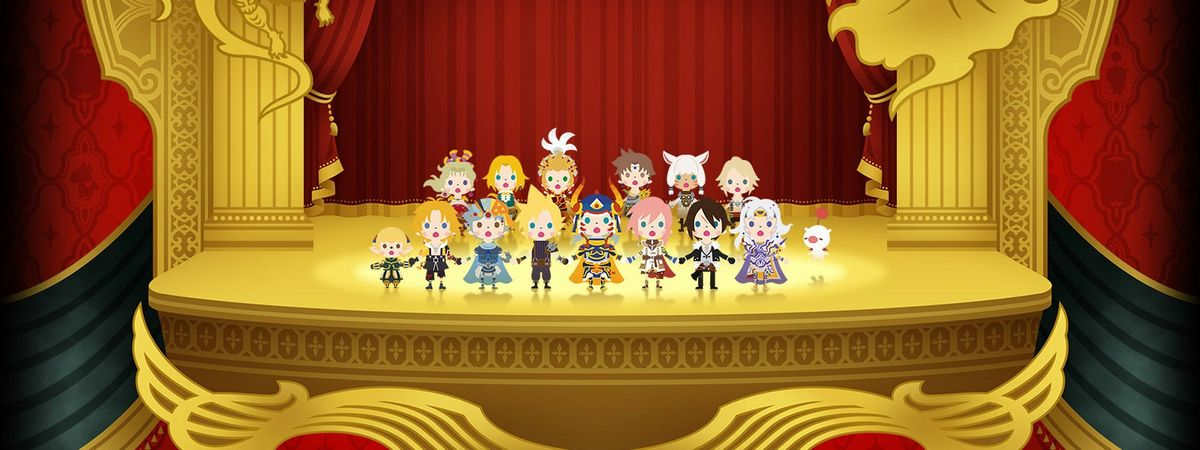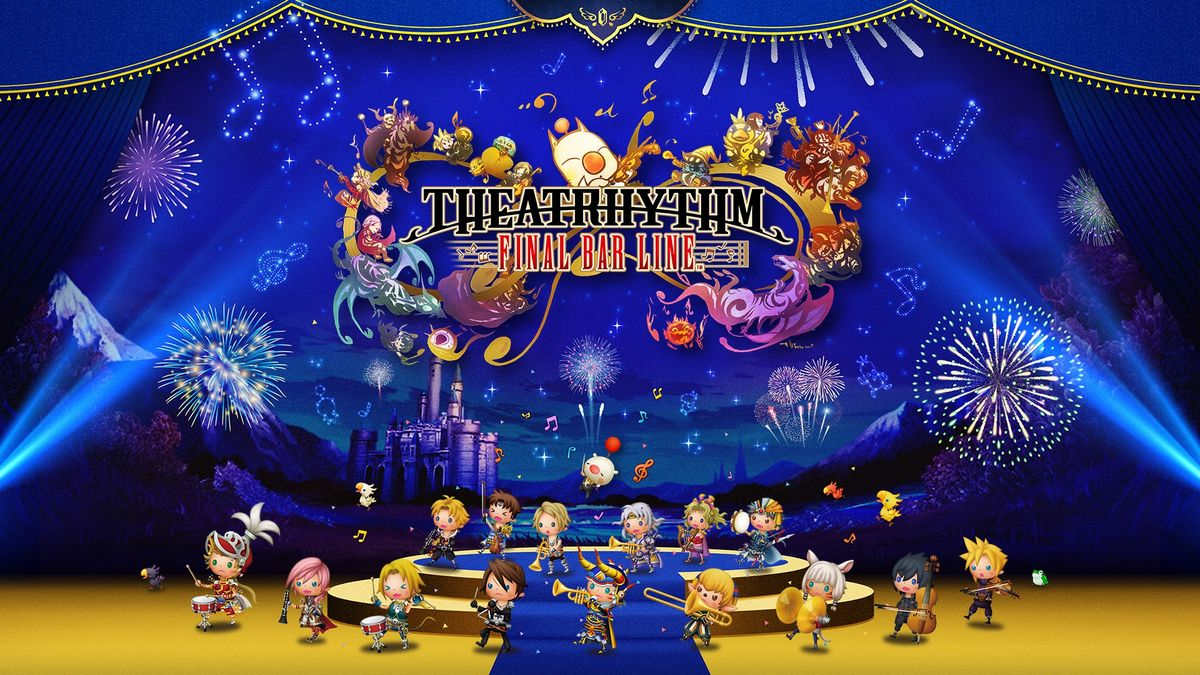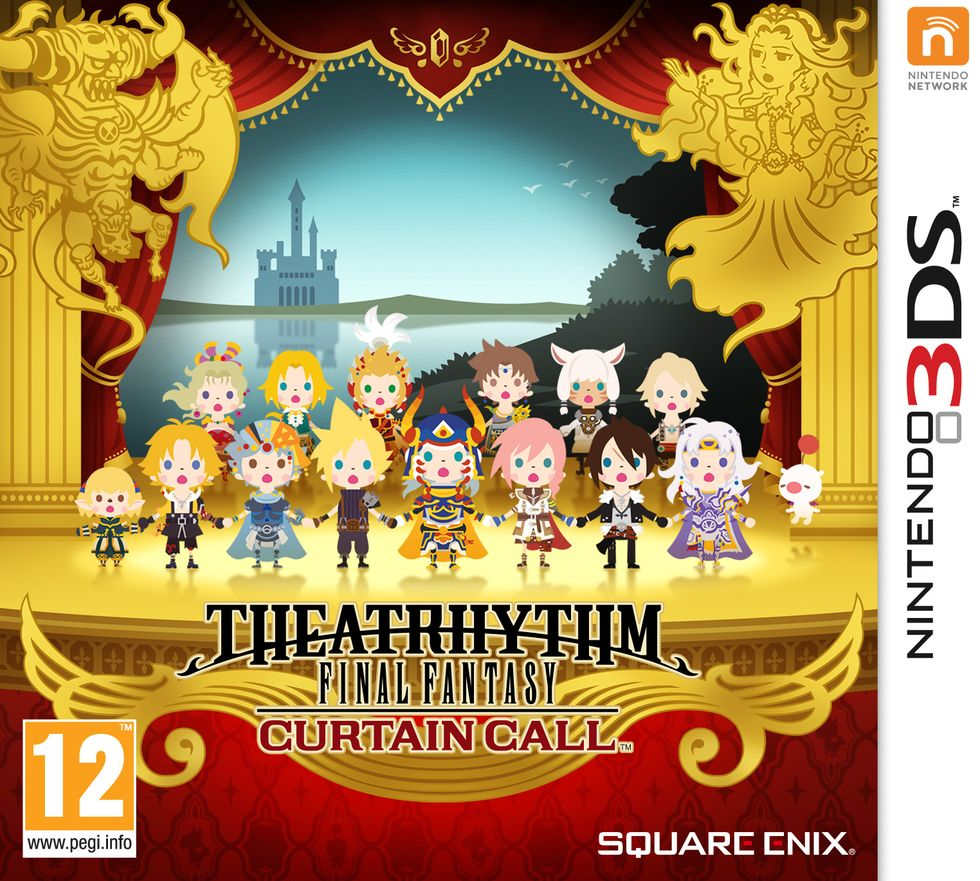The world of gaming has come a long way since its inception, with thousands of games being developed and released each year. One such game that has gained immense popularity in recent years is Theatrhythm Final Fantasy: Curtain Call. Developed by Square Enix, this rhythm-based video game combines the thrilling elements of the Final Fantasy series with captivating music and dance moves.
As an expert on gaming, it is quite clear to me that Theatrhythm Final Fantasy: Curtain Call stands apart from other games in terms of its unique gameplay style and immersive storytelling. The game features over 221 songs from various installments in the Final Fantasy series, including fan-favorites like “One Winged Angel” and “Eyes on Me”. Players can choose their favorite character from the franchise’s extensive roster and embark upon a musical adventure filled with exciting challenges.
The gameplay mechanics require players to tap along with iconic tunes while also engaging in battle sequences against enemies. With multiple difficulty levels, gamers can test their skills as they progress through various stages, unlocking new characters and songs along the way.
Moreover, Curtain Call also offers enhanced multiplayer modes allowing up to four players to compete or cooperate together for high scores across a range of different modes featuring co-op battles or head-to-head matches. This makes for an incredibly enjoyable experience both alone or alongside friends.
Overall, Theatrhythm Final Fantasy: Curtain Call certainly earns its place among some of the most beloved games in Square Enix’s library. Its innovative approach towards combining music with exciting gameplay ensures hours-long entertainment for fans young and old alike.
- The Role of Music in Theatrhythm Final Fantasy: Curtain Call
- Analyzing the Gameplay Mechanics in Theatrhythm Final Fantasy: Curtain Call
- A Brief History of the Theatrhythm Series and Its Impact on Rhythm Games
- Understanding the Complexities of Difficulty Levels in Theatrhythm Final Fantasy: Curtain Call
- How to Master Your Favorite Songs in Theatrhythm Final Fantasy: Curtain Call
- Notable Features and Customization Options for Players in Theatrhythm Final Fantasy: Curtain Call
- An Exploration of Multiplayer Modes and Co-op Play in Theatrhythm Final Fantasy: Curtain Call
- The Legacy Of Nobuo Uematsu’s Music In “Theatrethm” series
The Role of Music in Theatrhythm Final Fantasy: Curtain Call
The role of music in this game cannot be overstated, as it plays an integral part in creating an immersive and engaging gameplay experience for fans of the series.

The soundtrack of Theatrhythm Final Fantasy: Curtain Call spans across multiple games in the Final Fantasy franchise, featuring iconic tracks such as “One-Winged Angel” from Final Fantasy VII and “To Zanarkand” from Final Fantasy X. These songs are not just there to provide background music; they act as cues for players to time their button presses and swipes accurately, leading to successful note chains and higher scores.
In addition to providing a rhythmic challenge, each song also has its own unique stages with visually stunning backgrounds that change based on the progression of the song. This further immerses players into the world of Final Fantasy while playing through familiar tunes with new twists. Overall, music acts as both a challenge mechanic and storytelling device that enhances all aspects of gameplay within Theatrhythm Final Fantasy: Curtain Call.
Analyzing the Gameplay Mechanics in Theatrhythm Final Fantasy: Curtain Call
The game features characters and music from various Final Fantasy titles, allowing players to relive iconic moments while tapping along to their favorite tunes. However, the true essence of the game lies in its gameplay mechanics.

At its core, Theatrhythm Final Fantasy: Curtain Call revolves around three types of gameplay modes – Field Music Stages (FMS), Battle Music Stages (BMS), and Event Music Stages (EMS). These stages each provide unique challenges that test players’ rhythm skills in different ways. FMS levels require precise timing as players tap along with melodies and rhythms while traversing across environments inspired by classic Final Fantasy locales. BMS levels are more intense, requiring fast-paced button presses to keep up with enemy attacks in time with accompanying battle themes. Lastly, EMS stages challenge players’ reflexes as they react quickly to on-screen prompts during cinematic cutscenes.
To further add depth to the gameplay mechanics, Theatrhythm Final Fantasy: Curtain Call introduces an extensive customization system through character progression and equipment upgrades that affect player performance during each stage type. Players can level up their characters by earning experience points which unlock new abilities called “skills.” Additionally, equipping items such as weapons or accessories enhances specific stats such as strength or agility but can also have drawbacks like reducing accuracy or speed.
Overall, analyzing the intricate interplay between these gameplay mechanics provides insight into how Theatrhythm Final Fantasy: Curtain Call manages to be both engaging and challenging for gamers of all skill levels. Whether you’re a hardcore fan looking for a nostalgia trip or just someone who enjoys rhythmic games with RPG elements mixed in – this title has something for everyone!
A Brief History of the Theatrhythm Series and Its Impact on Rhythm Games
Developed by Square Enix, the first installment of Theatrhythm was released in 2012 for Nintendo 3DS and since then, it has become an increasingly popular title amongst gamers.
The gameplay of Theatrhythm revolves around tapping and swiping at certain points in time with songs from various titles within the Final Fantasy franchise. Aside from its unique take on rhythm games, what sets Theatrhythm apart is its integration of RPG elements such as leveling up characters and unlocking new content through progression.
With each successive release, Square Enix has added more features to enhance player experience including online playability and additional playable characters. Its impact on rhythm games cannot be understated; it represents a departure from traditional rhythm-based mechanics while simultaneously incorporating classic RPG elements into gameplay.
Overall, Theatrhythm’s success can largely be attributed to its melding of two seemingly disparate genres – musicianship and role-playing – into one cohesive whole. It has grown into an engaging gaming experience that satisfies both casual players looking for a fun diversion as well as hardcore fans dedicated to mastering every song available in the game.
Understanding the Complexities of Difficulty Levels in Theatrhythm Final Fantasy: Curtain Call
It features music from the popular Final Fantasy franchise and challenges players to tap, slide, and hold notes in time with the beat of each song. However, what sets this game apart from other rhythm games is its nuanced difficulty system.
Each song in Theatrhythm Final Fantasy: Curtain Call has four difficulty levels: Basic, Expert, Ultimate, and Special. Each level increases in complexity as more notes are added to the gameplay. In addition to this linear progression of difficulty levels, there are also different types of notes that require unique inputs such as flicking or tapping multiple times.
But it’s not just about hitting every note correctly – timing is crucial as well. The game utilizes a scoring system based on how accurately each note is hit within a designated window of time. This adds an extra layer of challenge for experienced players who strive for perfect accuracy.
Furthermore, certain songs have specific gimmicks or mechanics that can further increase their difficulty level beyond what might be expected based on their standard notation alone. For example, some songs may feature sections where notes move rapidly across the screen or require precise timing during long held notes.
Overall, Theatrhythm Final Fantasy: Curtain Call provides a challenging experience for both casual gamers and dedicated rhythm game enthusiasts alike through its intricate combination of increasing complexity levels combined with accurate timing requirements and unique gameplay mechanics per song making it one-of-a-kind amongst other rhythm games currently available on any gaming platform today!
How to Master Your Favorite Songs in Theatrhythm Final Fantasy: Curtain Call
First and foremost, it’s important to pay close attention to the rhythm and timing of each note. This means practicing regularly with different difficulty levels and paying attention to how the notes are spaced out within the song.
Another crucial element of mastering your favorite songs is learning how to use different abilities effectively. Each character in Theatrhythm Final Fantasy: Curtain Call has their own unique set of abilities that can be used during gameplay, so take some time to experiment with different combinations until you find what works best for you.
Finally, don’t forget about customization! One of the great things about this game is that you have a lot of control over which characters, songs, and abilities you use during gameplay. Take advantage of this by experimenting with different setups until you find one that feels comfortable and effective for you.
Overall, mastering your favorite songs in Theatrhythm Final Fantasy: Curtain Call takes practice, patience, and experimentation. By focusing on rhythm and timing, utilizing abilities effectively, and customizing your setup as needed, you’ll be well on your way towards achieving mastery over even the most challenging tracks in the game.
Notable Features and Customization Options for Players in Theatrhythm Final Fantasy: Curtain Call
As a music-based game, it features various notable gameplay mechanics and customization options that make it stand out from other titles in its genre. Some of these features include three different types of gameplay modes, over 200 playable songs from the Final Fantasy franchise, and customizable profiles for each player.
One unique feature of Theatrhythm Final Fantasy: Curtain Call is its three distinct gameplay modes – Field Music Stages (FMS), Battle Music Stages (BMS), and Event Music Stages (EMS). Each mode has its own set of rules and objectives that challenge players to improve their timing skills while enjoying iconic music tracks from the series. Additionally, players can collect “Rhythmia” points by clearing stages or completing challenges within each mode.

Another notable aspect of Theatrhythm Final Fantasy: Curtain Call is its extensive song library. With over 200 playable tracks ranging across all mainline entries in the series as well as spin-off titles like Tactics and Crystal Chronicles, there are countless musical selections available for fans to enjoy. Furthermore, new DLC songs were periodically added after release to further expand the selection pool.

Finally, players have access to several customization options in order to tailor their experience based on individual preference or skill level. This includes setting adjustable difficulty levels for FMS/BMS/EMS games modes either higher or lower depending on one’s comfort level with rhythm games overall; customizing controls such as button mapping; adjusting sounds effects volumes along with background audio volume settings so your play session doesn’t interfere with social interaction around you; etcetera! All these options allow any player regardless of skill level feel at home when playing this fantastic title!
An Exploration of Multiplayer Modes and Co-op Play in Theatrhythm Final Fantasy: Curtain Call
The game features various modes, including multiplayer and co-op play options that enhance the overall gameplay experience. In particular, the multiplayer mode allows players to compete against each other in real-time battles, while co-op play enables them to team up and tackle challenging songs together.
Multiplayer mode in Theatrhythm Final Fantasy: Curtain Call involves two players competing against each other on the same song with different difficulty levels. This mode requires not only musical skills but also strategic planning as players need to manage their health bars and use special abilities called “Limit breaks” wisely. It provides an exciting way for friends or online opponents to test their musical prowess while adding an element of competition.
Co-op play, on the other hand, enables two players to work together towards a common goal – achieving high scores or completing difficult challenge medleys. This mode encourages communication between players as they have to coordinate their moves and attacks effectively. Co-op play adds a unique layer of teamwork that enhances both social interaction and entertainment value.
Overall, Theatrhythm Final Fantasy: Curtain Call’s multiplayer modes offer diverse options for gamers looking for competitive challenges or cooperative experiences with friends. With its engaging gameplay mechanics and excellent selection of tracks from throughout the history of Final Fantasy franchise music composer Nobuo Uematsu’s iconic career score , it is no wonder why this game has garnered such critical acclaim within both casual gaming audiences alike as one of most innovative modern-day games available today!
The Legacy Of Nobuo Uematsu’s Music In “Theatrethm” series
As one of the most influential composers in video game history, Uematsu’s contributions to the Final Fantasy franchise have been nothing short of legendary. His compositions have become synonymous with the world of Final Fantasy, and his work on games like “Final Fantasy VI”, VIII”, and X” have helped shape modern video game music.
In “Theatrhythm Final Fantasy: Curtain Call,” Uematsu’s legacy lives on through a massive collection of songs that span several generations of games. From classic tracks like “One-Winged Angel” and “Terra’s Theme,” to more recent hits such as “Answers” and “Heavensward,” this game contains some of his greatest works from across the entire series.
But it isn’t just quantity that makes Uematsu’s musical legacy so significant in Theatrhythm; it’s also quality. Players are treated to stunning arrangements that take familiar melodies and transform them into something truly special. The result is an emotional journey that takes players on a nostalgic trip down memory lane while simultaneously introducing new fans to Uematsu’s incredible talent.
Overall, Nobuo Uematsu has left an indelible mark on both the Final Fantasy franchise and video game music as a whole. His contributions to Theatrhythm are no exception, offering players a chance to experience some of his most iconic works in a whole new way. Whether you’re a longtime fan or just discovering his work for the first time, there can be no denying how important he is to gaming culture -and nowhere is this more evident than in Theatrhythm Final Fantasy: Curtain Call.”
In conclusion, Theatrhythm Final Fantasy: Curtain Call is a highly innovative and engaging game that has revolutionized the way players experience music games. With its impressive collection of classic Final Fantasy tracks, stunning visuals, and intuitive gameplay mechanics, this game offers an immersive musical journey like no other.
What sets it apart from other rhythm games is its incorporation of RPG elements where players can customize their characters with different classes, abilities and equipment to improve their performance in the various stages. Additionally, the multiplayer mode allows players to compete against each other or collaborate in co-op play for added fun.
Overall, Theatrhythm Final Fantasy: Curtain Call is a must-have for any fan of the Final Fantasy series or anyone looking for a fresh take on rhythm games while enjoying nostalgic tunes from past titles. Its unique blend of role-playing elements with rhythm-based gameplay makes it one of the best musical experiences available on Nintendo 3DS today.
Read More:- Experience the Ultimate Beat with Rhythm Heaven Megamix Game!.
- Discover the Epic World of Asheron's Call: Immerse Yourself in a Thrilling Gaming Experience!.
- Experience Thrilling Survival in Game Song in the Smoke – The Ultimate Guide!.
- Experience the Epic Adventure of Final Fantasy IX: A Classic Game with Timeless Appeal! (69 characters).
- Discover the Magic of Final Fantasy V Advance: A Must-Play Game for RPG Fans.
- Experience Epic Adventure with Final Fantasy IV: The Ultimate Game of Strategy and Magic!.
- Master the Rhythms with Game Gitaroo Man: The Ultimate Music Adventure.